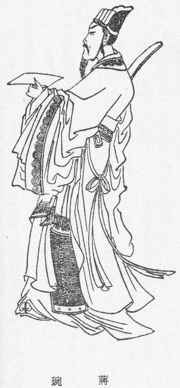Jiang Wan | |
|---|---|
| 蔣琬 | |
 A Qing dynasty illustration of Jiang Wan | |
| Grand Marshal (大司馬) | |
| In office April or May 239 – November or December 246 | |
| Monarch | Liu Shan |
| Manager of the Affairs of the Masters of Writing (錄尚書事) | |
| In office May 235 – November or December 243 | |
| Monarch | Liu Shan |
| Preceded by | Zhuge Liang |
| Succeeded by | Fei Yi |
| General-in-Chief (大將軍) | |
| In office May 235 – November or December 243 | |
| Monarch | Liu Shan |
| Succeeded by | Fei Yi |
| Inspector of Yi Province (益州刺史) | |
| In office 234–244 | |
| Monarch | Liu Shan |
| Preceded by | Zhuge Liang (as Governor) |
| Succeeded by | Fei Yi |
| Protector-General (都護) (acting) | |
| In office 234 – May 235 | |
| Monarch | Liu Shan |
| Prefect of the Masters of Writing (尚書令) | |
| In office 234 – May 235 | |
| Monarch | Liu Shan |
| Succeeded by | Fei Yi |
| Personal details | |
| Born | Unknown[1] Xiangxiang, Hunan |
| Died | November or December 246[a] Mianyang, Sichuan |
| Resting place | Mianyang, Sichuan |
| Relations | |
| Children |
|
| Occupation | Military general, politician, regent |
| Courtesy name | Gongyan (公琰) |
| Posthumous name | Marquis Gong (恭侯) |
| Peerage | Marquis of Anyang Village (安陽亭侯) |
Jiang Wan (died November or December 246),[a] courtesy name Gongyan, was a Chinese military general, politician, and regent of the state of Shu during the Three Kingdoms period of China.[3] Born in the late Eastern Han dynasty, Jiang Wan initially served as a scribe, county chief and county prefect under the warlord Liu Bei, who later became the founding emperor of Shu. After Liu Bei's son Liu Shan succeeded his father as emperor in 223, Jiang Wan gradually rose to prominence under the regency of Zhuge Liang, the Imperial Chancellor of Shu. Between 228 and 234, while Zhuge Liang was away leading Shu forces on the Northern Expeditions against Shu's rival state Wei, Jiang Wan took charge of internal affairs and provided logistical support to the Shu forces at the frontline. After Zhuge Liang's death in 234, Jiang Wan succeeded him as regent and did well in gaining the Shu people's confidence and leading them into a post-Zhuge Liang era. During this time, he considered that the land-based route through the Qin Mountains used by Zhuge Liang during the Northern Expeditions was too difficult for navigation and transportation of supplies. He thus came up with a plan to switch to a water-based route along the Han River targeting Wei territories in present-day southern Shaanxi and northwestern Hubei. However, the Shu government rejected his plan as they thought it was too risky. In 243, due to poor health, Jiang Wan relocated from Hanzhong near the Wei–Shu border to Fu County (present-day Mianyang, Sichuan). Towards the final years of his regency, as his health worsened, Jiang Wan gradually relinquished his powers to his deputies Fei Yi and Dong Yun but he continued to rule as regent in name. He died in late 246 and was succeeded by Fei Yi.
- ^ According to the chronology of Jiang Wan's biography in Sanguozhi, he was at least in his early 20s when he joined Liu Bei in 209/210. Thus, his birth year should be in the 180s or before.
- ^ ([延熙九年]冬十一月,大司馬蔣琬卒。) Sanguozhi vol. 33.
- ^ de Crespigny (2007), p. 378.
Cite error: There are <ref group=lower-alpha> tags or {{efn}} templates on this page, but the references will not show without a {{reflist|group=lower-alpha}} template or {{notelist}} template (see the help page).